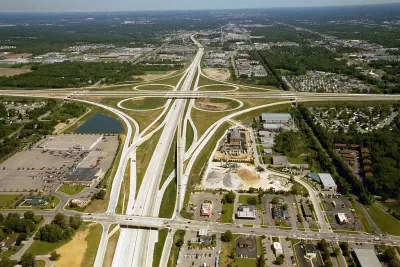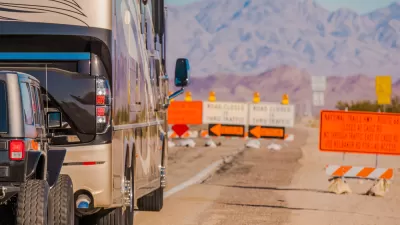The gas tax, suburban highway spending cycle is both self-serving and self-destructive, according to this article.

"Higher gas taxes are (likely) coming across the Midwest, framed by Ohio, Michigan and Wisconsin Democrats and Republicans alike as an offensive against potholes — but in reality a boondoggle that will soak taxpayers and create more of the car dependence that has devastated Midwestern cities like Detroit, Cleveland and Milwaukee," according to an article by Angie Schmitt.
The article breaks down the problem with the new gas tax in each of these states, starting with Michigan. Michigan's proposed gas tax increase of 45 cents would raise up to $2.5 billion a year. While the gas tax has been promoted by a campaign website titled "Fix the Damn Roads," the Michigan Department of Transportation doesn't want to stop with fixing old roads. They want to build new roads.
The state is planning two highway projects for the Detroit region alone totaling $4 billion. According to official population estimates, Southeast Michigan’s population grew only about 1 percent between 2010 and 2018. The growth that did occur was concentrated in the suburbs that these highways are designed to serve. During the same period, Wayne County — where Detroit is located, lost 3.8 percent of its population. Meanwhile, suburban Oakland County grew 4.5 percent.
The stories from Ohio are similar, and Schmitt connects the dots to make the point that highway expansions tend to benefit sprawl while perpetuating the inequities and lack of financial resilience that plagues many of the urban areas in these states.
FULL STORY: Midwest Will Raise Gas Taxes — And Make Everything Worse

Alabama: Trump Terminates Settlements for Black Communities Harmed By Raw Sewage
Trump deemed the landmark civil rights agreement “illegal DEI and environmental justice policy.”

Planetizen Federal Action Tracker
A weekly monitor of how Trump’s orders and actions are impacting planners and planning in America.

How Atlanta Built 7,000 Housing Units in 3 Years
The city’s comprehensive, neighborhood-focused housing strategy focuses on identifying properties and land that can be repurposed for housing and encouraging development in underserved neighborhoods.

In Both Crashes and Crime, Public Transportation is Far Safer than Driving
Contrary to popular assumptions, public transportation has far lower crash and crime rates than automobile travel. For safer communities, improve and encourage transit travel.

Report: Zoning Reforms Should Complement Nashville’s Ambitious Transit Plan
Without reform, restrictive zoning codes will limit the impact of the city’s planned transit expansion and could exclude some of the residents who depend on transit the most.

Judge Orders Release of Frozen IRA, IIJA Funding
The decision is a victory for environmental groups who charged that freezing funds for critical infrastructure and disaster response programs caused “real and irreparable harm” to communities.
Urban Design for Planners 1: Software Tools
This six-course series explores essential urban design concepts using open source software and equips planners with the tools they need to participate fully in the urban design process.
Planning for Universal Design
Learn the tools for implementing Universal Design in planning regulations.
Caltrans
Smith Gee Studio
Institute for Housing and Urban Development Studies (IHS)
City of Grandview
Harvard GSD Executive Education
Toledo-Lucas County Plan Commissions
Salt Lake City
NYU Wagner Graduate School of Public Service





























